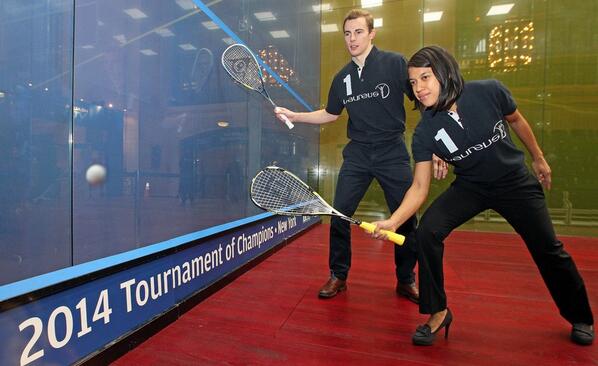
Enduring champions like Nick Matthew and Nicol David constantly respond and adapt to new challenges
By JOSH TAYLOR – Squash Mad Coaching Columnist
Great champions are often revered more in hindsight than when they are actually playing, especially if, in the twilight of their careers, they slip down the rankings. However, in squash, we have two magnificent, enduring champions in Nick Matthew and Nicol David.
Nick may have surrendered his position as world number one and world champion, but he showed in Chicago that he is still capable of putting together back-to-back performances of the highest quality.
As he despatched the current number two and number one, Gregory Gaultier and Mohamed Elshorbagy, an astonishing statistic came to light, with just one and two unforced errors in those two epic encounters that produced straight-games victories to win the Windy City Open.
Nicol David, having fought back from match-ball down to win back her World Open crown in front of a fiery home crowd backing Raneem El Welily in Cairo in December, succumbed to the Egyptian in the Chicago final.
How she chooses to respond to the growing threat of a wave of younger opponents, many from Egypt, will determine and define this phase of her career.
Here, Squash Mad coaching columnist JOSH TAYLOR examines the hunger and desire that drives on these two great champions.
Still learning new tricks – Nick Matthew and Nicol David
In this modern era of sport, which is highly commentated on and analysed, we seem to write off players once they pass the milestone age of 30.
However, with modern training techniques, greater understanding of our bodies and the demands that sport places on them, I think we will continue to see athletes’ careers extend and champions of advanced years.
That’s even with the physicality of our sports, as athletes continue to become better conditioned and more physically prepared for the battle at hand. What stands out most, as a key for the long-lasting champion, is the mental mindset, fortitude and desire of an athlete to keep achieving.
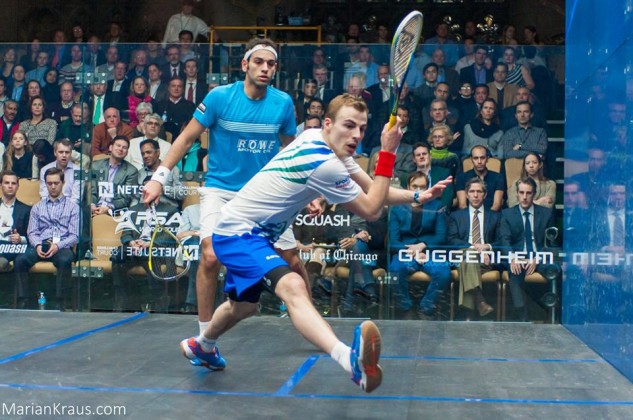
Nick Matthew and Nicol David are two athletes over the age of 30, being 34 and 31 respectively. Nick’s recent triumph in becoming the oldest winner of a World Series event, last week in the Windy City Open, again highlights that he is around for a little longer yet. And, for Nicol, her landmark of 106 months at the helm of the Women’s Tour shows the incredible consistency she has achieved throughout her career.
The long careers they have had, and continue to enjoy in squash, show abilities that transcend the sport in which they are competing. In terms of time at the top, it means that they have had to evolve and adapt with the changing generations. The competition that they once chased is now chasing them.
If we look to other sports, older champions aren’t unique to squash, far from it. Football has given us people like Ryan Giggs, who kept playing at the top level till the age of 40. Tennis also shows us older champions. Roger Federer, despite being written off by various commentators, is still very much mixing it at two in the world at the age of 33. In women’s tennis, the remarkable Martina Navratilova eventually retired at 49.
Even in a sport so physically demanding as rugby union, we see people such as Brad Thorn, who still is regularly representing Leicester Tigers in the top tier of the sport at the age of 40.
Within squash we have seen plenty of older champions. Jonah Barrington won his last National title aged 39, Heather McKay won her last titles in the World Championships and British Open at the ages of 38 and 36 respectively. And Hashim Khan’s last British Open title came at the age of 44 in 1958. So it appears Nick and Nicol are spring chickens in comparison.
So what is the making of a long-lasting and successful career in sport? What can we draw from these two great champions?
What stands out to me is their continued desire to learn and achieve in their sport. I am not for a second saying that Nick and Nicol aren’t happy with their careers and achievements.
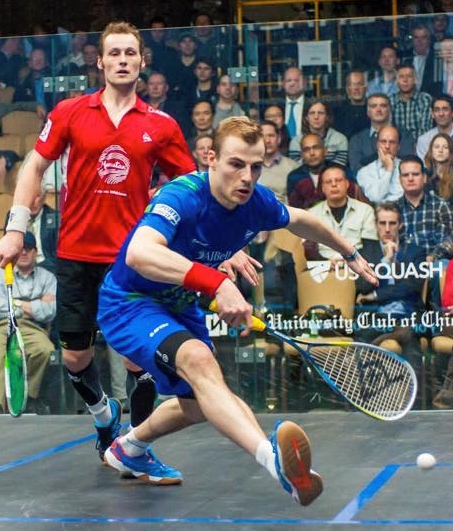
However, their need to achieve isn’t truly satisfied; they show strong desires to continue their development, learning and, importantly, achieving. The desire to get the feeling of playing their best squash still resounds as a strong motivator to them.
In a recent interview in the run-up to the Canary Wharf Classic, Nick was quoted as saying he wants to ‘win every tournament he enters’. That statement in itself shows that burning internal drive for success that Nick possesses. And Nicol is no different, expressing a similar desire in a recent interview with Squash Skills.
This reflects strongly in their careers, as they continue to get repeat success rather than be satisfied with being a one-hit wonder. If we look to sport we can see many examples of this and examples where players have retired early. People such as Michael Chang, who won a grand slam in tennis at the age of 17 but never achieved the height again, or Buster Douglas, the boxer who beat Tyson, or Bjorn Borg, who retired at just 26.
A big thing I see in both these players which has allowed long, prosperous careers is an open or growth mindset to the game; there is strong desire to learn new skills and continually develop their game, as explained in Carol Dweck’s work, a nicely put-together book called Mindset.
This is also a common trait of those showing a Task Approach mindset explained within the 2×2 Achievement Goal Theory. Both these mindsets within the setting of sport can lead to a continued drive internally to develop one’s skills in learning new things, rather than being driven by the trophies and external rewards that come from success in sport.
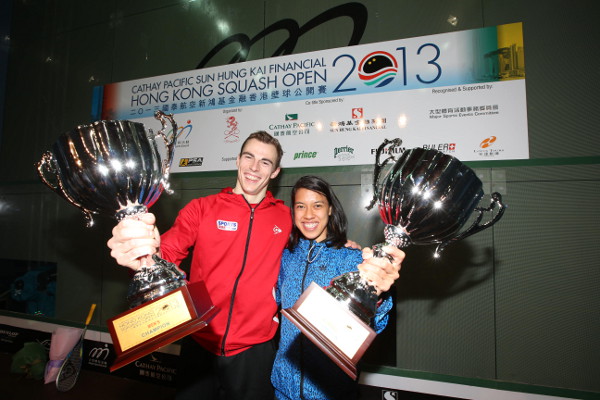
In Nicol’s interview she expressed the still very strong desire to improve every aspect of her game. She talked about improving the small technical aspects, refining and implementing self-measured or internal performance in trying to become “as close to a complete player as she can”.
Nick is no different, and has expressed this same view numerous times. This I feel is a much stronger motivator and an internal force which continues to drive these players far more than the accolades that flow from these attempts to better themselves in the sport.
Nick has shown evidence of this in his recent form, winning the British Grand Prix in December, a seventh National Title last month, followed by the Case Swedish Open title, and now most recently in holding off the leader of the tidal wave of young Egyptian talent in Chicago.
In getting to this point he has had to not only train smarter to manage his resources but he has also had to adapt once more to deal with the assets that Mohamed Elshorbagy is bringing to the game. I think we saw that adaptation from Nick in the final last week.
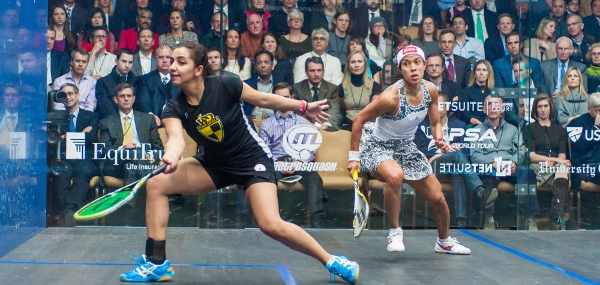
For Nicol, I think we are starting to see her have to adapt and change again to deal with the new increasing threats posed by Raneem El Welily. Nicol is at a point where she could retire as a great champion.
However, I think that drive still remains strong as she tries to become what she sees as the most complete player. This drive I think will see her adapt to her new challenges and will see new heights from her yet to come.
If we finally look to many player-development models used in sport, and drawn up in sport science, they often seem to reach an end at the world-class, or performance stage. At this stage, particularly when over the age of 30, everything is portrayed to be complete, finished, with maintenance set as the main aim.
Looking over these two champions’ careers, I think it is fair to say they have never met this stage and, they have instead remained within the refinement, investment or development stages, where they continue to develop, refine and improve their skills.
If we are going to continue to allow players to really reach their goals, continue their development and not just reach a great level, but a really world-class level, this is where our players must reside.
From here, long-term internal motivation and drive exists within the task-related goals of improving ability rather than the medal count.
If we look to these two great squash champions, Nick and Nicol, I think that they have this mindset in abundance and will continue to adapt and succeed in the sport for as long as their bodies allow and their mindset remains one with a desire to improve.
Pictures by MARIAN KRAUS (Windy City Open) and from Squash Mad archive


